DENTAL IMPLANT SURGERY
A Beautiful Foundation for a Confident Smile:
Expert Dental Implant Surgery at Advanced Facial Surgery
At Advanced Facial Surgery, dental implant surgery offers a life-changing solution for patients looking to restore their smile with natural-looking, fully functional teeth. This advanced procedure replaces the roots of missing or damaged teeth with strong, metal posts, giving you a sturdy foundation for your new, beautifully crafted teeth. Whether you're struggling with ill-fitting dentures or facing challenges with bridgework, dental implants can offer a more comfortable and lasting alternative.
Dr. Manolis Manolakakis, DMD, FACS, a dual board-certified cosmetic and reconstructive facial surgeon, brings his extensive expertise and compassionate care to every dental implant surgery he performs. His meticulous approach ensures that each step is personalized to your unique needs. Depending on your jawbone condition and the type of implant used, the process may require several stages. However, the result is well worth the time invested, as the implants become firmly integrated with your bone, providing secure support for years to come.
With Dr. Manolakakis’ expert guidance, you’ll have the support you need throughout the entire journey, making the experience as comfortable and seamless as possible.





The results speak for themselves
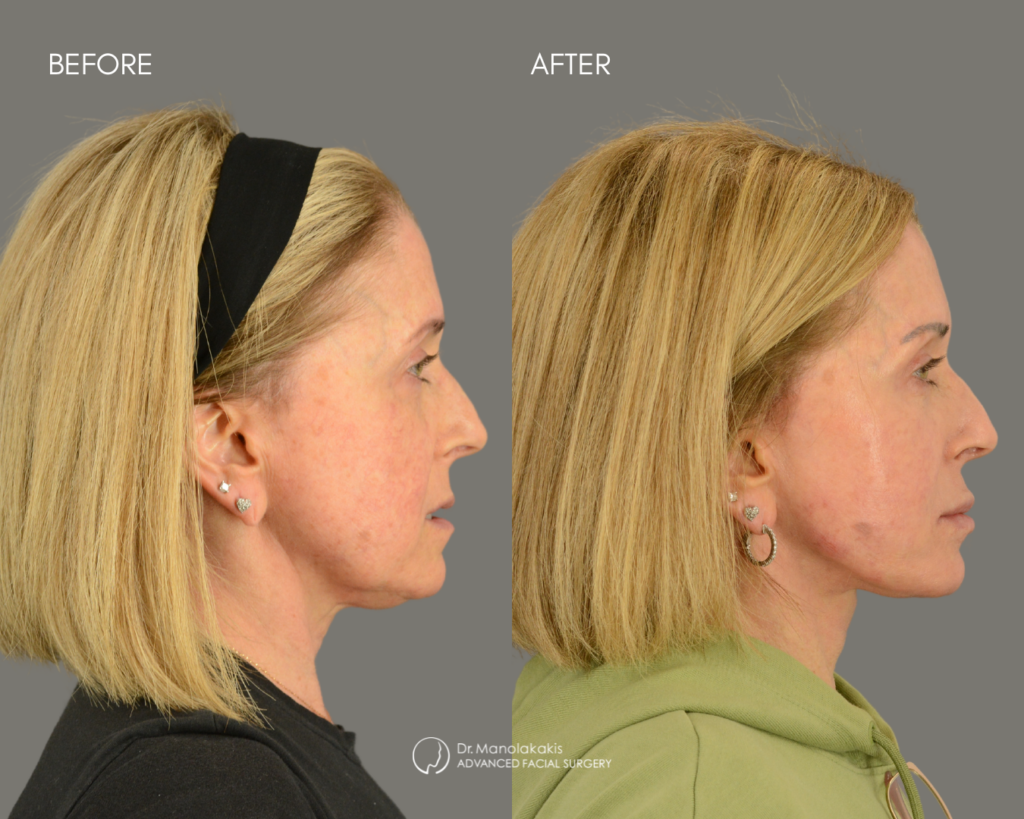
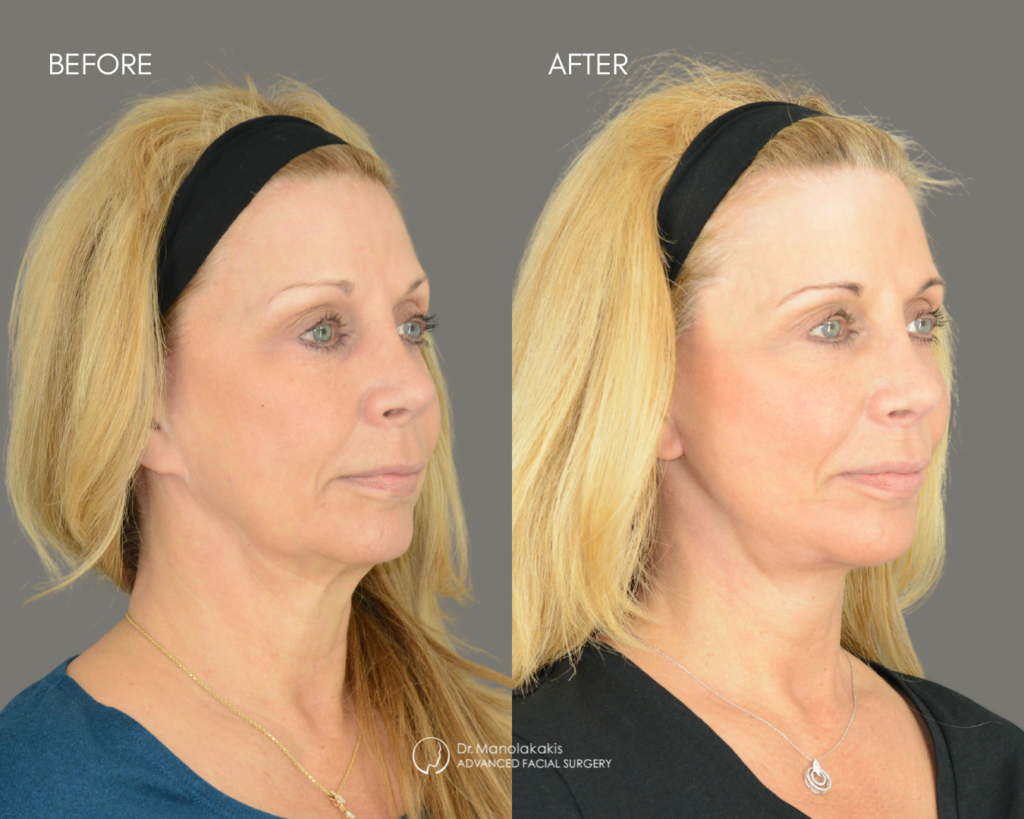
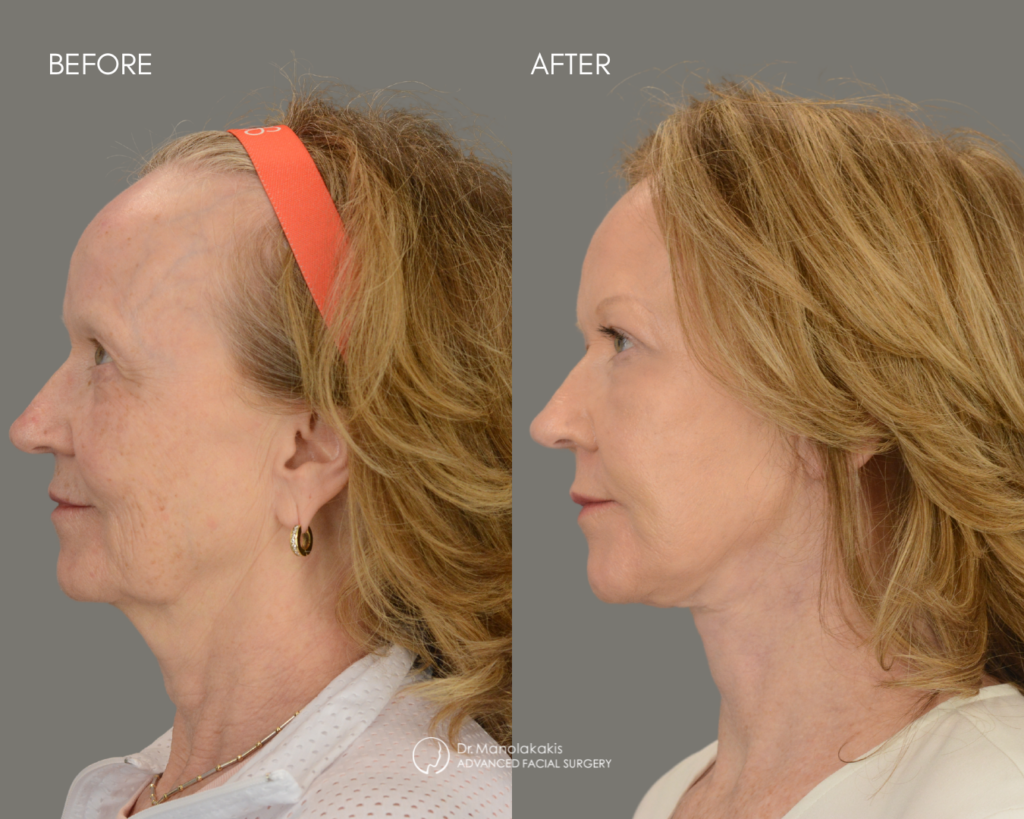
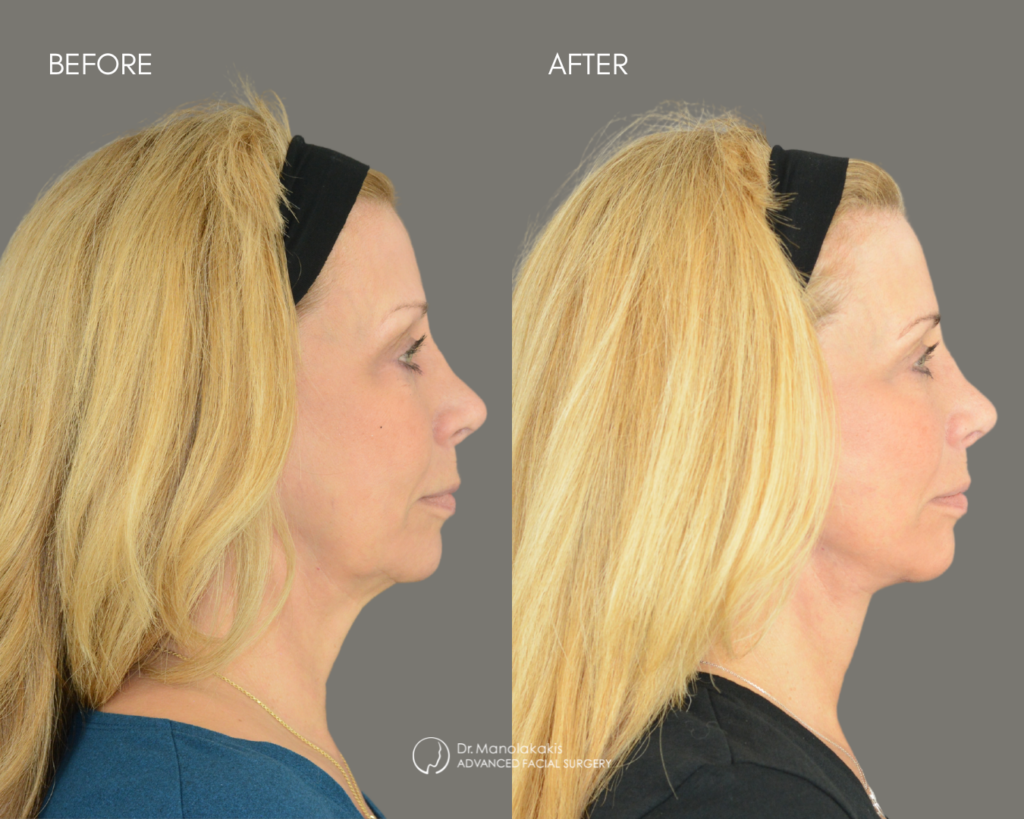
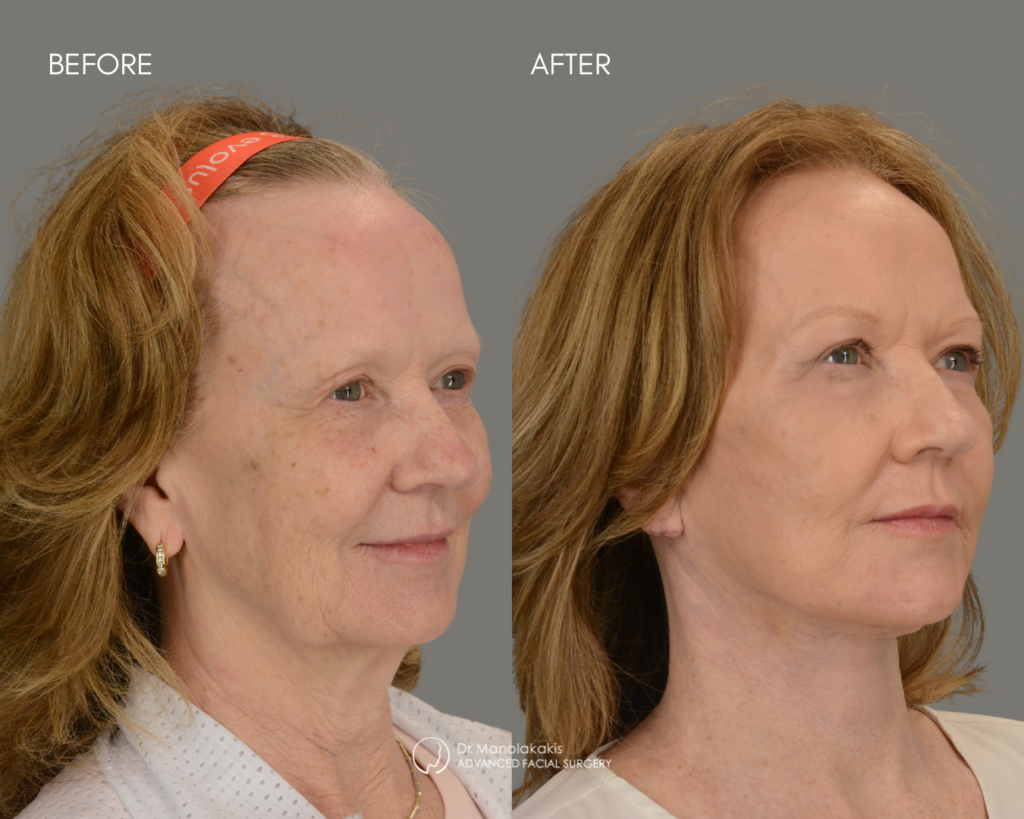
Why it's done
Dental implants are a long-lasting solution to missing teeth, designed to restore both function and appearance while improving your overall oral health. When placed in your jawbone, these implants act as sturdy, replacement roots for your teeth.
Made from titanium, they naturally bond with your jawbone, providing a secure foundation that won’t shift or cause discomfort like traditional dentures or bridgework. Another advantage is that dental implants are made from materials that won’t decay, providing you with a durable, reliable option for years to come.
You may be a good candidate for dental implants if:
- You have one or more missing teeth
- Your jawbone has fully developed
- You have enough bone to support the implants or can undergo a bone graft
- Your oral health is in good condition
- You don’t have medical conditions that could interfere with healing
- You prefer an alternative to dentures
- You’re looking to enhance your speech and smile
- You’re ready to commit to the time it takes for the procedure
- You do not smoke tobacco
The expertise of Dr. Manolakakis ensures that the implant process is tailored to meet your specific needs, assuring that you feel comfortable, supported, and confident through every step.
As with any surgical procedure, dental implant surgery does carry some potential risks, though complications are uncommon and typically minor. Most issues, if they arise, can be treated easily and effectively. It’s important to be aware of possible risks, which include infection at the site of the implant, injury or damage to nearby teeth or blood vessels, nerve damage, which may cause temporary pain, numbness, or tingling in your teeth, gums, lips, or chin, sinus complications, especially if implants in the upper jaw extend into the sinus cavity
Dr. M. takes every precaution to minimize these risks, and his compassionate approach ensures that any concerns are addressed promptly, keeping your comfort and safety a top priority throughout the process.
Preparing for dental implant surgery is an important step to ensure a smooth and successful procedure. The planning process often involves a team of specialists working together to give you the best care possible. This team can include Dr. Manolis Manolakakis, an expert in facial reconstruction surgery, as well as other specialists like a periodontist, who focuses on gum and bone health, or a prosthodontist, who designs and fits your new teeth. In some cases, an ENT specialist may also be consulted.
Because dental implants involve one or more surgeries, a thorough evaluation is essential to prepare you for the process. This typically includes:
- Comprehensive dental exam: This may involve dental X-rays, 3D imaging, and creating models of your teeth and jaw to ensure the best outcome.
- Medical history review: Be sure to inform Dr. M. about any health conditions or medications you're taking, including over-the-counter drugs and supplements. If you have certain heart conditions or orthopedic implants, antibiotics may be prescribed before surgery to reduce the risk of infection.
- Personalized treatment plan: Your treatment plan will be customized based on factors like how many teeth need replacing and the condition of your jawbone and remaining teeth.
To ensure your comfort during the surgery, there are several anesthesia options, including local anesthesia, sedation, or general anesthesia. The dental care team at Advanced Facial Surgery will help you choose the option that best suits your needs. Depending on the type of anesthesia used, you may need to follow specific instructions regarding eating and drinking before the surgery. If sedation or general anesthesia is used, you'll need someone to drive you home, and it's recommended to rest for the remainder of the day. We’ll prioritize your comfort and well-being, guiding you through every step of the process with care and compassion.
Dental implant surgery is typically performed as an outpatient procedure, and carefully performed in stages to ensure the best possible results. While the entire process may take several months, much of this time allows for healing and the development of a strong foundation for your new teeth. Here's what to expect during the journey:
- Removal of the damaged tooth (if necessary)
- Preparation of the jawbone, which may include grafting if additional support is needed
- Placement of the dental implant, where a small titanium post is inserted into your jawbone to act as a replacement root
- Bone healing and growth, allowing the implant to fuse securely with your jawbone
- Placement of the abutment, which connects the implant to your new tooth
- Placement of the artificial tooth, designed to match your natural teeth in both function and appearance
The entire process can take several months, with most of the time dedicated to healing and ensuring that your jawbone integrates with the implant. Depending on your unique needs, some steps may be combined to streamline the process. Dr. M. and his team will guide you through each stage with care and precision to ensure that you’re comfortable and well-informed step by step.
If your jawbone isn’t thick or strong enough, a bone graft may be necessary before proceeding with dental implant surgery. This step helps ensure that your implant has a solid foundation, as your jawbone needs to be able to withstand the pressure from everyday chewing. Without this stability, the implant might not succeed. A bone graft strengthens and rebuilds your jawbone, creating a firm base for the implant.
There are several options for bone graft materials. You might receive a graft from another part of your body (natural bone graft) or use a synthetic option, which acts as a scaffold for new bone growth. Dr. M. will work closely with you to choose the best option for your unique needs.
The grafted bone may take a few months to grow enough to support the implant securely. However, in some cases, only minor grafting is required, and this can be done at the same time as the dental implant surgery. The condition of your jawbone will determine the best approach.
During your dental implant surgery, Dr. M. will carefully make a small incision in your gum to access the underlying bone. A precise opening is then made in the bone to place the metal post that will act as the root for your new tooth. This post is inserted deep into the bone, providing a strong, secure foundation for the final tooth.
After the post is placed, there may be a temporary gap where your tooth is missing. If you’d like, a partial, temporary denture can be provided to maintain your smile’s appearance. This denture can easily be removed for cleaning or while you sleep, ensuring both comfort and convenience as you heal.
Placing the abutment is the next step after osseointegration is complete. The abutment is the small piece that connects your dental implant to the crown, the visible part of your new tooth. This minor procedure is usually done with local anesthesia in an outpatient setting, making it a simple and comfortable process.
Here’s what happens during the abutment placement:
- Dr. M. will gently reopen your gum to access the dental implant.
- The abutment is then securely attached to the implant.
- The gum tissue is closed around, but not over, the abutment, allowing it to remain exposed for the next step.
In some cases, the abutment can be attached when the implant post is placed, so you won't need an additional procedure. However, because the abutment will be visible just above your gum line until your permanent crown is placed, some people prefer to have it done separately for aesthetic reasons.
Once the abutment is in place, your gums will need about two weeks to heal before Dr. M. can attach the artificial tooth. Throughout this process, Dr. M. and the team at Advanced Facial Surgery will ensure your comfort and provide the personalized care you need to achieve a beautiful, natural-looking smile.
Whether your dental implant surgery is completed in one stage or over several, it’s normal to experience some common discomforts that are typical with any type of dental procedure. These may include swelling in your gums and face, bruising on your skin and gums, pain around the implant site, and/or minor bleeding.
To help manage these symptoms, Dr. M. may prescribe pain medication or antibiotics. If you notice any increased swelling, discomfort, or other issues in the days following surgery, don’t hesitate to reach out to your medical team at Advanced Facial Surgery for guidance and support.
After each stage of your surgery, you’ll likely need to stick to soft foods for a short time to allow the surgical area to heal properly. Dr. Manolakakis typically uses dissolvable stitches, so they won’t need to be removed. If your stitches are not self-dissolving, he will take care of them during a follow-up appointment.
Most dental implants are successful, but occasionally the bone may not fuse properly with the metal implant. Factors like smoking can increase the risk of complications and implant failure.
If this happens, the implant can be gently removed, the area cleaned, and you can restart the process again after about three months to give your bone time to heal.
To ensure your dental implants — and your natural teeth — last as long as possible, here are a few key things you can do. Just like with natural teeth, it's important to keep your implants, artificial teeth, and gums clean. Special brushes, like an interdental brush that fits between teeth, can help reach the small spaces around your teeth, gums, and metal posts to keep everything in top shape. Regular checkups are essential to monitor the health of your implants. Your dentist can ensure everything is functioning properly and provide professional cleanings to maintain your overall oral health. Stay away from chewing on hard objects like ice or hard candy, which can damage both your crowns and natural teeth. It's also a good idea to avoid tobacco and excessive caffeine, which can stain your teeth. If you grind your teeth, seek treatment to prevent damage to your implants.
At Advanced Facial Surgery, Dr. Manolis Manolakakis and his team are committed to helping you achieve long-term success with your implants. We offer guidance and support every step of the way, and prioritize your healing process to ensure that everything progresses smoothly, giving you the best possible outcome for a beautiful, lasting smile!
Risks involved
As with any surgical procedure, dental implant surgery does carry some potential risks, though complications are uncommon and typically minor. Most issues, if they arise, can be treated easily and effectively. It’s important to be aware of possible risks, which include infection at the site of the implant, injury or damage to nearby teeth or blood vessels, nerve damage, which may cause temporary pain, numbness, or tingling in your teeth, gums, lips, or chin, sinus complications, especially if implants in the upper jaw extend into the sinus cavity
Dr. M. takes every precaution to minimize these risks, and his compassionate approach ensures that any concerns are addressed promptly, keeping your comfort and safety a top priority throughout the process.
How to prepare for your dental implant surgery
Preparing for dental implant surgery is an important step to ensure a smooth and successful procedure. The planning process often involves a team of specialists working together to give you the best care possible. This team can include Dr. Manolis Manolakakis, an expert in facial reconstruction surgery, as well as other specialists like a periodontist, who focuses on gum and bone health, or a prosthodontist, who designs and fits your new teeth. In some cases, an ENT specialist may also be consulted.
Because dental implants involve one or more surgeries, a thorough evaluation is essential to prepare you for the process. This typically includes:
- Comprehensive dental exam: This may involve dental X-rays, 3D imaging, and creating models of your teeth and jaw to ensure the best outcome.
- Medical history review: Be sure to inform Dr. M. about any health conditions or medications you're taking, including over-the-counter drugs and supplements. If you have certain heart conditions or orthopedic implants, antibiotics may be prescribed before surgery to reduce the risk of infection.
- Personalized treatment plan: Your treatment plan will be customized based on factors like how many teeth need replacing and the condition of your jawbone and remaining teeth.
To ensure your comfort during the surgery, there are several anesthesia options, including local anesthesia, sedation, or general anesthesia. The dental care team at Advanced Facial Surgery will help you choose the option that best suits your needs. Depending on the type of anesthesia used, you may need to follow specific instructions regarding eating and drinking before the surgery. If sedation or general anesthesia is used, you'll need someone to drive you home, and it's recommended to rest for the remainder of the day. We’ll prioritize your comfort and well-being, guiding you through every step of the process with care and compassion.
What you can expect in your dental implant surgery journey
Dental implant surgery is typically performed as an outpatient procedure, and carefully performed in stages to ensure the best possible results. While the entire process may take several months, much of this time allows for healing and the development of a strong foundation for your new teeth. Here's what to expect during the journey:
- Removal of the damaged tooth (if necessary)
- Preparation of the jawbone, which may include grafting if additional support is needed
- Placement of the dental implant, where a small titanium post is inserted into your jawbone to act as a replacement root
- Bone healing and growth, allowing the implant to fuse securely with your jawbone
- Placement of the abutment, which connects the implant to your new tooth
- Placement of the artificial tooth, designed to match your natural teeth in both function and appearance
The entire process can take several months, with most of the time dedicated to healing and ensuring that your jawbone integrates with the implant. Depending on your unique needs, some steps may be combined to streamline the process. Dr. M. and his team will guide you through each stage with care and precision to ensure that you’re comfortable and well-informed step by step.
When bone grafting is required
If your jawbone isn’t thick or strong enough, a bone graft may be necessary before proceeding with dental implant surgery. This step helps ensure that your implant has a solid foundation, as your jawbone needs to be able to withstand the pressure from everyday chewing. Without this stability, the implant might not succeed. A bone graft strengthens and rebuilds your jawbone, creating a firm base for the implant.
There are several options for bone graft materials. You might receive a graft from another part of your body (natural bone graft) or use a synthetic option, which acts as a scaffold for new bone growth. Dr. M. will work closely with you to choose the best option for your unique needs.
The grafted bone may take a few months to grow enough to support the implant securely. However, in some cases, only minor grafting is required, and this can be done at the same time as the dental implant surgery. The condition of your jawbone will determine the best approach.
Placing the dental implant
During your dental implant surgery, Dr. M. will carefully make a small incision in your gum to access the underlying bone. A precise opening is then made in the bone to place the metal post that will act as the root for your new tooth. This post is inserted deep into the bone, providing a strong, secure foundation for the final tooth.
After the post is placed, there may be a temporary gap where your tooth is missing. If you’d like, a partial, temporary denture can be provided to maintain your smile’s appearance. This denture can easily be removed for cleaning or while you sleep, ensuring both comfort and convenience as you heal.
Waiting for bone growth
After the metal implant post is placed in your jawbone, a natural process called osseointegration (oss-ee-oh-in-tuh-GRAY-shun) begins. This is when your jawbone gradually grows around and fuses with the surface of the implant. Although this process can take a few months, it’s essential for creating a strong, secure foundation for your new tooth—similar to how the roots of your natural teeth work to keep them firmly in place.
Placing the abutment
Placing the abutment is the next step after osseointegration is complete. The abutment is the small piece that connects your dental implant to the crown, the visible part of your new tooth. This minor procedure is usually done with local anesthesia in an outpatient setting, making it a simple and comfortable process.
Here’s what happens during the abutment placement:
- Dr. M. will gently reopen your gum to access the dental implant.
- The abutment is then securely attached to the implant.
- The gum tissue is closed around, but not over, the abutment, allowing it to remain exposed for the next step.
In some cases, the abutment can be attached when the implant post is placed, so you won't need an additional procedure. However, because the abutment will be visible just above your gum line until your permanent crown is placed, some people prefer to have it done separately for aesthetic reasons.
Once the abutment is in place, your gums will need about two weeks to heal before Dr. M. can attach the artificial tooth. Throughout this process, Dr. M. and the team at Advanced Facial Surgery will ensure your comfort and provide the personalized care you need to achieve a beautiful, natural-looking smile.
Choosing your new artificial teeth
Once your gums have healed, the next step is to take impressions of your mouth and remaining teeth. These impressions help create your custom crown — the artificial tooth designed to look and function just like a natural tooth. The crown will be placed once your jawbone is strong enough to fully support the new tooth.
Dr. M. will work closely with you to choose the type of artificial tooth that best fits your lifestyle and needs. Then you’ll have two main options to choose from:
- Removable Option: Similar to a traditional denture, this option can be either partial or full and includes artificial teeth set in pink plastic gums. The denture snaps securely into place on a metal frame attached to the implant abutment. One of the benefits of a removable option is that it can be easily taken out for cleaning or repair.
- Fixed Option: A fixed option involves permanently securing the artificial tooth to the implant abutment using screws or cement. This tooth is not removable for cleaning or during sleep, making it a more permanent solution. In most cases, each crown is attached to its implant, but in some situations, one implant can support multiple teeth if they are bridged together.
With either choice, you’ll have the guidance and expertise of Dr. Manolakakis, ensuring that your new teeth are both functional and aesthetically pleasing.
After your procedure
Whether your dental implant surgery is completed in one stage or over several, it’s normal to experience some common discomforts that are typical with any type of dental procedure. These may include swelling in your gums and face, bruising on your skin and gums, pain around the implant site, and/or minor bleeding.
To help manage these symptoms, Dr. M. may prescribe pain medication or antibiotics. If you notice any increased swelling, discomfort, or other issues in the days following surgery, don’t hesitate to reach out to your medical team at Advanced Facial Surgery for guidance and support.
After each stage of your surgery, you’ll likely need to stick to soft foods for a short time to allow the surgical area to heal properly. Dr. Manolakakis typically uses dissolvable stitches, so they won’t need to be removed. If your stitches are not self-dissolving, he will take care of them during a follow-up appointment.
Managing your Results
Most dental implants are successful, but occasionally the bone may not fuse properly with the metal implant. Factors like smoking can increase the risk of complications and implant failure.
If this happens, the implant can be gently removed, the area cleaned, and you can restart the process again after about three months to give your bone time to heal.
To ensure your dental implants — and your natural teeth — last as long as possible, here are a few key things you can do. Just like with natural teeth, it's important to keep your implants, artificial teeth, and gums clean. Special brushes, like an interdental brush that fits between teeth, can help reach the small spaces around your teeth, gums, and metal posts to keep everything in top shape. Regular checkups are essential to monitor the health of your implants. Your dentist can ensure everything is functioning properly and provide professional cleanings to maintain your overall oral health. Stay away from chewing on hard objects like ice or hard candy, which can damage both your crowns and natural teeth. It's also a good idea to avoid tobacco and excessive caffeine, which can stain your teeth. If you grind your teeth, seek treatment to prevent damage to your implants.
At Advanced Facial Surgery, Dr. Manolis Manolakakis and his team are committed to helping you achieve long-term success with your implants. We offer guidance and support every step of the way, and prioritize your healing process to ensure that everything progresses smoothly, giving you the best possible outcome for a beautiful, lasting smile!

Dr. Manolakakis
Dr. Manolakakis takes a conservative and integrative approach to medicine, designing personalized treatment plans for each individual that comes to Advanced Facial Surgery in need of a change. He specializes in facial cosmetic surgery and non-surgical treatments, facial reconstruction, maxillofacial trauma management, jaw surgery, and cleft lip and palate repair.
Related Procedures
Facelift
If you’re not happy with the way you look after years of aging, and non-surgical treatments like fillers and Botox® are not enough anymore, you might consider getting a facelift!
Brow Lift
A brow lift, generally called a forehead lift or browplasty, is a sophisticated cosmetic procedure designed to elevate the eyebrows, smooth away forehead wrinkles, and soften frown lines.
Morpheus8
This exclusive, minimally invasive treatment we offer here at AFS combines the artistry of microneedling with the power of radiofrequency (RF) energy to beautifully restore and refine your skin.
Testimonials
EXCELLENTTrustindex verifies that the original source of the review is Google. Hello i was very pleased with the results and excellent care i received. Dr M, Britt and all the staff are highly skilled, exceptional professionals that immediately reassure their patients that everything is taken care of and we are in safe hands.Thank you all.Posted onTrustindex verifies that the original source of the review is Google. I can’t say enough about his office in NYC. My experiences there have been nothing less than fantastic from Brit You won’t be disappointed.Posted onTrustindex verifies that the original source of the review is Google. I had a great experience with Dr. M and his entire staff. I felt fully supported during the entire process and very well cared for. My transformation was exactly what I asked for and better than I hoped for. I highly recommend them!Posted onTrustindex verifies that the original source of the review is Google. I just went for my second appt with Britt and I can’t say enough about the treatment 2 weeks ago I went in with concerns about the wrinkles around my eyes and a little sag ..I also said I like my forehead the way it is I like expression..well the results I feel are fabulous and when I went in today for a follow up touch up ..well both thought everything looked great and she did not try and up sell I what I didn’t really need …I’m 55 and don’t mind 55Posted onTrustindex verifies that the original source of the review is Google. Dr. Manalakakis is an extremely talented plastic surgeon and a great guy. He is fastidious and will make sure that you are happy with his work. His staff is great and makes you feel welcome. His right hand, Nurse Britt is very talented and a pleasure to deal with. His front desk person,,Christen, is very friendly and makes sure your appointments are on time. I’m leaving out some names but all the staff makes you feel at home and important. Both my wife and I have had work done by him and I would recommend him to everyone. I wouldn’t go anywhere else.Posted onTrustindex verifies that the original source of the review is Google. My experience has been extremely wonderful from the time I met dr Manolakakis and his staff. They made me feel very comfortable. I would highly recommend them!Posted onTrustindex verifies that the original source of the review is Google. I can’t even begin to tell you all the elements that contributed to the most positive experience(s) I have ever had, with the amazing Dr.Manolis & his incredible & stellar staff! He is truly an artist & an incredible human being. If you want to looker fresher, younger, more beautiful., if you want the best, most natural results, then Dr.Manolis is your man, to do what is right for you! He takes the utmost pride in “the type” of “specialized” & “elevated work” he does. Theres a reason it’s called “ADVANCED FACIAL SURGERY” & there’s no comparison to his work! His staff are the most professional, kind hearted, welcoming, supportive people who will treat you like royalty. You will feel so comfortable, held & guided by these people, both in his beautiful plastic surgery suite & his separate aesthetics suite at Advanced Facial Plastic surgery. It has been 6 months since my procedures. People see themselves from the front view every day. But I recently took a random profile selfie and literally GASPED at the amazing results I received by Dr.Manolis! I didn’t know I looked like this and almost cried. The results have impacted my life in the most positive ways and are truly life changing! I thank Dr.Manolis & his staff from the bottom of my heart. So grateful to have found them!Posted onTrustindex verifies that the original source of the review is Google. Dr. M and his team are the best of the best! He recently removed a keloid from my ear and he made the process so easy. Everyone was kind and comforting, and Dr. M explained everything clearly, which really put me at ease (and I'm an anxious patient). And my ear looks great! You would never know anything was ever there!! I'm so grateful for Dr. M and his team's skill and care.Posted onTrustindex verifies that the original source of the review is Google. Incredibly gifted surgeon and medical staff. You will be so well taken care of! Highly recommend, could not be happier to be a patient of Advanced Facial Surgery!


